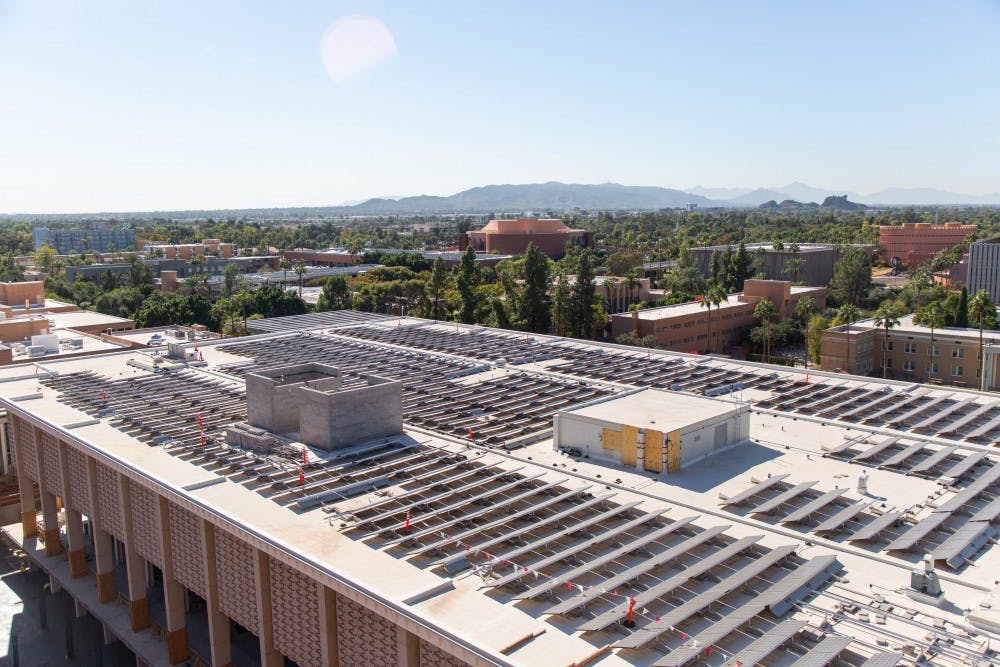The sunniest state in the nation rejected a historically progressive measure toward renewable energy which would have amended Arizona’s constitution to mandate that the state gets 50 percent of its energy from renewable sources by 2030.
After Proposition 127 failed, ASU professors and researchers involved in solar policy left with mixed outlooks on the future of renewable energy in Arizona.
“Of course, there’s all the true believers of solar moving forward, and there’s a large number in this state” Ronald Roedel, a professor emeritus at the Ira A. Fulton School of Engineering, said. “I think, actually, this will work out OK.”
Voters, on the other hand, weren't so optimistic about solar. The controversial ballot measure, which was funded and fueled by billionaire and progressive activist Tom Steyer, was rejected by more than a 2-to-1 margin.
The battle over Proposition 127 was high rolling and hard fought, the priciest ballot initiative campaign in state history. More than $54 million was spent by both during the campaign, according to campaign finance records, with the bulk of the spending coming from Steyer on one side and local utility Arizona Public Service and its parent, Pinnacle West Capital Corporation, on the other.
The rejection of the measure ensured – at least in the near future – that Arizona would stay on its current track to receive 15 percent of its energy from renewable sources.
Tim James, an ASU sustainability scientist and director of research and consulting at the Seidman Research Institute, said the measure failed because of its restrictive timeline.
"2030 is too tight a deadline to move away from what we currently have generating electricity in the state to a more renewable portfolio," James said.
That said, Arizona voters are supportive of pursuing more renewable energy in the abstract. A June 2018 poll of 500 Arizona residents conducted by the Center of Western Priorities found that 86 percent of Arizonans sampled supported increased investment in renewable energy.
Martin Pasqualetti, an ASU professor at the School of Geographical Sciences and Urban Planning said the energy companies opposed to Proposition 127 are delaying the inevitable.
“Look at (Salt River Project) and APS ... You all know it’s coming,” Pasqualetti said. “There’s a multi-billion dollar opportunity to move forward rather than stay the way it is.”
The day of investment into renewable energy sources has not yet come for the politicians or Arizona’s energy providers, Pasqualetti said.
But with the election of pro-renewable energy candidate Sandra Kennedy to the Arizona Corporation Commission, which regulates the state's utilities, the majority of the commission's members will be pro-solar moving forward, Ronald Roedel said.
“Commissioner (Andy) Tobin, who's a relatively new member, proposed in January an Arizona Energy Modernization Plan, which could completely upend the current power and energy electricity development and generation in this state,” Roedel said.
The Arizona Energy Modernization Plan aims to have at least 80 percent of Arizona’s energy come from clean energy sources by 2050.
“Most people believe the Corporation Commission is in the pocket of the utilities and just does their beck and call,” Roedel said, referencing the group’s recent history with a conflict-of-interest dispute, a bribery mistrial and claims of unfair rate increases.
“It almost certainly was the case in the not too recent past, but I have a feeling things are changing," Roedel said. "I just have a sense here that we are on the verge of something new and important."
Reach the reporter at cbudnies@asu.edu or follow @ChaseHBudnies on Twitter.
Like The State Press on Facebook and follow @statepress on Twitter.




